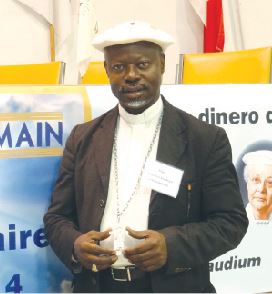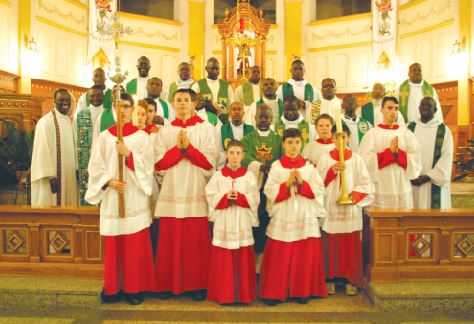 Bishop Mathieu Madega proudly shows the pectoral cross he received as a gift from Cardinal Lacroix of Quebec City, when he celebrated the Mass at Quebec City’s cathedral on Sunday, August 24, 2014. Bishop Mathieu Madega proudly shows the pectoral cross he received as a gift from Cardinal Lacroix of Quebec City, when he celebrated the Mass at Quebec City’s cathedral on Sunday, August 24, 2014. |
As usual, our International Congress in Rougemont in 2014 was preceded by a study session (August 19-28) on economic democracy (or social credit), viewed in the light of the social doctrine of the Church, based on the book by Alain Pilote, “The Social Credit proposals explained in ten lessons.”
More than 50 priests and faithful of Africa and other countries attended the session, including Bishop Mathieu Madega Lebouakehan, Bishop of Mouila and President of the Conference of Bishops of Gabon. It was his third participation in such a session in Rougemont. (Note that the next study session on economic democracy in Rougemont will take place April 20-May 2, 2015, followed by our week of adoration in front of the Blessed Sacrament, May 3-10.)
Bishop Madega became an ardent proponent of Social Credit, talking about it everywhere, even during his visits in Rome (he delivered personally to Pope Francis our book of ten lessons). Here are extracts from what what Bishop Madega told us at the conclusion of our study session in Rougemont, on August 28, 2014:
by Bishop Mathieu Madega Lebouakehan
“The Lord says to my Lord: ‘Sit at My right hand until I make your enemies a footstool for your feet.’” (Psalms 110:1)
We have come to take part in this session, and we thank the Lord. And to try to meditate upon this “treasure, which I have made my own”, Jesus tells us in John, 10:10, “I came that they may have life, and have it abundantly.”Therefore:
1. We must live.
2. To live, we must satisfy our basic needs and even our secondary needs.
3. In order to do this, we need to work.
4. But, in working, we cannot obtain everything that we need.
5. We therefore need to exchange what we have with others.
6. What, then, is the means of exchange?
Let us say that we will exchange a quantity X of product A with a quantity Y of product B. In this exchange, money is nothing but a unit of measurement of the value of the products. This unit could be either maple leaves, rocks, feathers… or money. Money is therefore conventionally accepted as means of payment in exchanges between producers and consumers. Mark you, today it is not those who are buying the products, goods and services who create the money, but others. These means of payment are controlled by other people, for their own benefit. (Note: nowadays. as Douglas explains on page 11, money is more a means of distribution than a means of exchange.)
The issue is this: we want to exchange products and services among ourselves in order to live. Why then, do we permit others to interfere in our transactions, to our disadvantage — and always to our disadvantage? If these people intervened to make our exchanges easier and allow us to live in peace, no one would complain; so how can we explain that, within our exchanges, we let someone else make life more complicated? (See Louis Even’s article on page 14.)
 Mass during our Congress on Sunday, August 31, 2014, at St. Michael’s church in Rougemont, with the priests who took part in our study session. In the center, Bishop Madega of Gabon. Mass during our Congress on Sunday, August 31, 2014, at St. Michael’s church in Rougemont, with the priests who took part in our study session. In the center, Bishop Madega of Gabon. |
Let us sit down together and make a decision: let us banish from our midst this capital sin of laziness. Why do I say this is a sin of laziness? Because, even though these other people who control money do it in a way that harms us, we let them think on our behalf, we let them decide our fate. To this we must say, “No, no and no!” What, then, should we do?
Let us begin by “thinking” in the official light of the teaching of the Catholic Church, along with Douglas, Louis Even and the Pilgrims of St. Michael. Then, let us take action, and live as happy and as prosperous as Divine Providence will permit. Living, of course, in accordance with the Will of God our Father. Live in peace with God, with others, and with ourselves.
We should think like this: Money is nothing but a number, figures, digits, a symbol. It is not the “number” that is the real wealth. Here I have a paper on which I write the words, “nine chairs”. There is obviously a difference between this paper, and the 9 chairs stacked in the corner of the room. If I crinkle up this paper and throw it away, it is gone. But the nine chairs do not disappear. The fact is that, the figures on the paper are just that; figures. These figures are accepted as means of payment because they allow us to live, to purchase goods and services.
To accept, as we do today, that we must starve to death because of an absence of figures is not worthy of anyone who “thinks”! With our without the paper on which I wrote the words “nine chairs”, the nine chairs actually exist, materially speaking. The figures are not the chairs; they are simply a symbol of the chairs, and a symbol is not the real thing. Money is a ticket, a symbol that represents something that is real (e.g. products). I think we understand now that it is not money that is the real wealth...
In the book, The Social Credit Proposals Explained in 10 Lessons, by Alain Pilote, we read, “…one country freeing itself from this dictatorship and issuing its own interest and debt-free currency, setting the example of what an honest system could be, would be enough to bring about the worldwide collapse of the bankers’ swindling debt-money system.”
I would like to add to this, one word; effectively. “…one country freeing itself effectively from this dictatorship…” Not by giving the system a new façade, as though changing the color with a fresh coat of paint. No, it must be done with a national consciousness, that everyone will see that this is the path to true freedom. Someone pointed out that nature does not lend to anyone. What has God ever loaned to any of you? He has given you everything! And if God gives us everything, why then do some bankers appropriate for themselves what God has given us, and then lend it to others? Do you find that normal? But what is the problem? The problem is that, he who covers up the crime is the biggest liar.
To take it a bit further we can say that we are all children of God our Father, Creator of Heaven and Earth. And if God who gives us all the goods of the Earth, started charging us interest, making His children slaves — would you find this normal? All too often we turn from God — Who is the Light of the world — and we fall into darkness.
To face the academic world, we must discover the truth of the facts. But it is not only rationality, we also need a living faith. In faith we love even the “bad” bankers. With love, we can overcome evil.
What more can I say to you, my friends! When I came here the first time you tried to convince me… and the second time, again… this is now my third time here and I am persuaded. To have persuaded me, two things were necessary:
1. To speak well of my God and of my Church. If you do not speak well of my God and my Church, I will listen with love, and I will ask you if we can walk together, but do not speak badly of my God or Holy Mother, the Church.
2. The subject must be rational and logical. If it is not rational or logical, I can not walk with you.
I want you to remember that Social Credit is applied Christianity. Only one person can raise us up; that is the Risen Christ. Let us all remain united in faith, hope and charity.
+ Bishop Mathieu Madega Lebouakehan